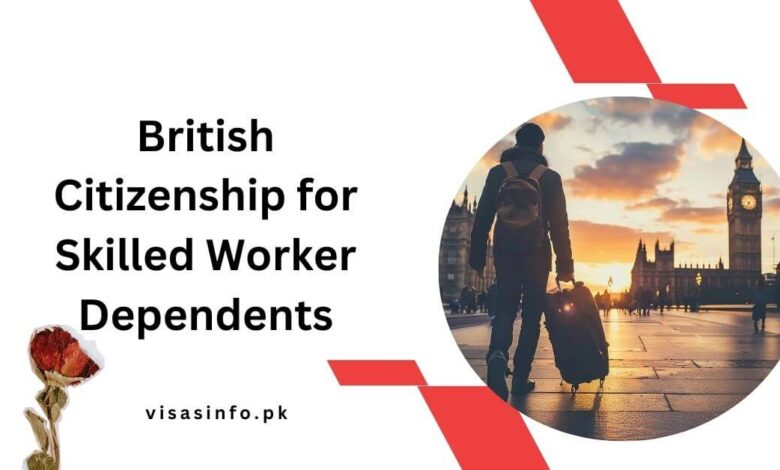British Citizenship for Skilled Worker Dependents – 2024

Skill is a prerequisite for British citizenship. Do you have any inquiries regarding the process of applying to become a British citizen as a skilled migrant dependent after receiving ILR? If you are curious about whether it is possible to apply for British citizenship after receiving ILR as a dependent skilled worker, you have arrived at the appropriate location. This post will provide you with additional information regarding this topic.
Individuals who consent to permanent employment in the United Kingdom also consent to the possibility of relocating their families there. In recognition of this, qualified professionals and their partners may qualify for Indefinite Leave to Remain (ILR) and obtain British citizenship upon completing the required residency period in the Kingdom.
Furthermore, it will require a minimum of six years after relocating to the United Kingdom with your skilled worker spouse to be eligible for naturalization as a British citizen. It necessitates a minimum of five years of continuous residence in the United Kingdom, followed by a minimum of one year of ILR possession.
It is important to acknowledge that the location to which you and your skilled worker spouse relocate in the UK will be determined by the specific dates of your case. If you are a British citizen who is married to an existing citizen and wishes to apply for naturalization, the period of citizenship may be reduced to five years. In this instance, it is unnecessary to maintain ILR for a minimum of 12 months before application.
Nevertheless, it is necessary to maintain detailed records of your in- and out-of-country travels if you are a skilled worker spouse residing in the UK to obtain ILR and/or British citizenship. This is because both ILR and Naturalization applications have residence requirements.
Check Also: New Changes for the UK Health Care Visa – Check Here
UK Health and Care Worker Visa Updates
The health and care worker visas in the United Kingdom have undergone recent modifications. This article provides additional information regarding it. There has been a significant amount of discourse in response to the UK government’s recent proposal to increase the visa requirements for foreign caregivers.
Home Secretary and Immigration Minister Robert Jenrich is making an effort to prevent low-skilled caregivers from bringing their families to the country. The action is in response to the conservative party’s apprehension regarding the rise in the number of immigrants entering the UK under Health and Social Care worker visas in the previous year.
The consequences are evident, regardless of whether the precise timing of these modifications has been disclosed. Foreign caregivers who are inadequately qualified may encounter challenges in relocating their families to this region. Some individuals may even opt to depart the country, which would have a substantial adverse effect on the social care sector.
Consequently, advocates and experts encourage applicants to enhance their qualifications by obtaining a degree in their country of origin and remaining informed about current events through authorized channels. The care industry is experiencing an increase in concern regarding potential issues with staff recruitment and retention, particularly because employees are required to work extended hours for inadequate compensation.
Nevertheless, the public has responded favorably to the liberties of care workers. It is widely believed that these employees make significant contributions to the social sector. Consequently, any action that causes them to be dissatisfied could potentially reduce the quality of care provided in the country.
Benefits of British Citizenship for Skilled Worker Dependents
- Right to Remain: British citizens are entitled to permanently reside in the United Kingdom without any immigration restrictions, which ensures the security of their dependents.
- Public Services: Citizenship provides access to public services, such as healthcare through the National Health Service (NHS), education, and social services.
- Employment Opportunities: The employment prospects and job mobility of dependents who become British citizens are enhanced by their ability to work in any position without a visa.
- Ability to Sponsor Family Members: British citizens have the option to sponsor other family members to join them in the UK, which simplifies the process of reuniting with loved ones.
- Travel Benefits: British citizens are granted greater flexibility in their travel arrangements, such as the ability to enter numerous countries without a visa and more convenient access to consular assistance while abroad.
- Voting Rights: Citizenship provides the right to vote in local and national elections, enabling dependents to participate in the democratic process.
- Access to Education: Higher education may be more affordable than international fees for dependents who acquire citizenship and qualify for domestic student fees at UK universities.
- Deportation Protection: Dependents are safeguarded from deportation as citizens, which ensures their security and tranquility during their residency.
- Dual Citizenship: The United Kingdom permits dual citizenship, which enables dependents to maintain their original citizenship while simultaneously utilizing the advantages of British citizenship.
- Community Engagement: Citizenship enables dependents to completely engage in their communities, participate in cultural activities, and contribute to society by fostering a sense of belonging.
UK Asylum Latest Backlog
There is a significant risk of homelessness for thousands of refugees. The likelihood of destitution for thousands of immigrants has been elevated due to a substantial backlog in the United Kingdom’s asylum system. This section will provide additional information regarding this situation.
The British Red Cross has expressed profound concerns. 50,000 refugees may be at risk of becoming destitute by the conclusion of 2024 This crisis was precipitated by the government’s commitment to confirm all Legacy Asylum claims submitted by June 28, 2024.
If the government is successful in achieving its objective, 53,100 refugees may become destitute, which would impose a time limit on the move-on process. The 28-day move-on procedure has been expedited by the home office. Upon receiving refugee status, the individual is obligated to vacate the state-sponsored lodging for the duration of this period. Remarkably, certain refugees have only seven days to locate new residences.
The Appeal from the British Red Cross
The Red Cross suggested that the government reevaluate the changes made to the move-on period and grant a 56-day extension. This will provide the newly admitted refugees with an abundance of time to secure housing, employment, or benefits.
The importance of this personal stability and support is underscored by Alex Fraser, the director of refugee support for the British Red Cross. A significant number of them have already encountered traumatic events.
How have these changes impacted?
A report is presently available that indicates a 140% increase in destitution among the refugees assisted by the British Red Cross since the change was implemented as planned in August. In June and July, there were 132; in August and September, there were 3,117. The refugee charities in London, Northwest England, and Glasgow are concerned about the numerous locations that continue to be affected.
The situation is frustrating, as it anticipates fatalities from hypothermia and other illnesses, according to Shauna Roberts of the Merseyside Refugee Support Network. Other refugee NGOs also expressed concern regarding the escalating destitute crisis.
Home Office Response
The home office emphasized that each asylum application is primarily evaluated individually and stated that they do not recognize these forecasts. They assert that refugees must promptly implement their subsequent course of action after the outcome of their application. The situation functions as a stark reminder of the necessity for enhanced asylum and refugee policies. The well-being of thousands of refugees is jeopardized.
Frequently Asked Questions:
-
Can skilled workers bring dependants to the UK?
Your partner and children can also apply to join you or stay in the UK as your ‘dependants’ if they’re eligible. They’ll need to complete separate applications. If your partner or child’s application is successful, their visa will usually end on the same date as yours.
-
Can I bring my family to the UK with a Skilled Worker visa?
With a Skilled Worker visa, you can work in an eligible job. Study. Bring your partner and children with you as your ‘dependants’, if they’re eligible.
-
Can I get British citizenship through a work visa?
As a UK work permit holder, you can qualify for permanent residence if you have lived and worked in the UK for a minimum of five years. Once you have satisfied the five-year requirement, you may qualify for Indefinite Leave to remain in the UK, which can then be followed by British Naturalisation as a UK citizen



